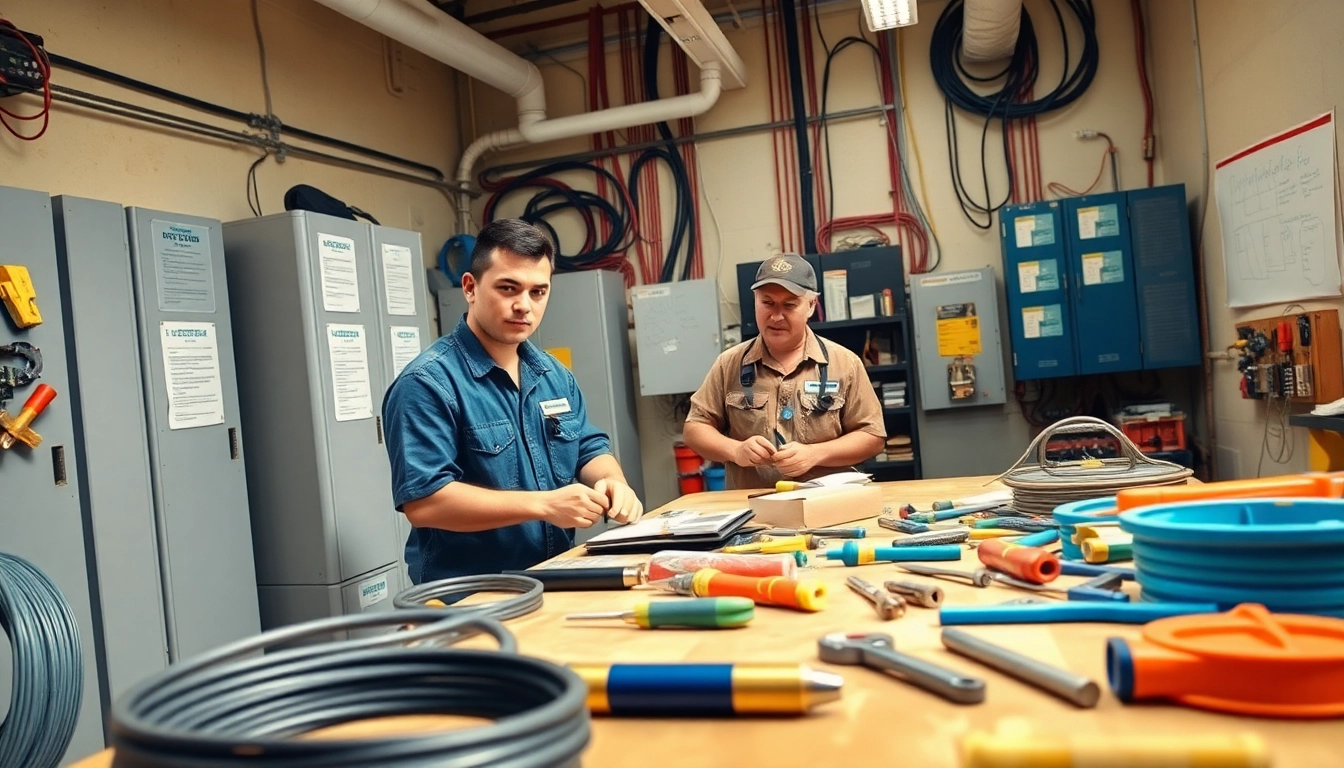Introduction to Construction Trade Schools in Texas
Texas is renowned for its booming construction industry, fueled by a steady influx of new projects, urban development, and infrastructure needs. As the demand for skilled laborers continues to rise, construction trade schools in Texas play a crucial role in equipping individuals with the essential skills needed to succeed in various construction-related careers. With a variety of training programs available, these institutions not only provide industry-relevant education but also focus on hands-on training that allows students to apply their knowledge in real-world settings. For anyone considering a future in construction, understanding the landscape of trade schools is invaluable.
Trade education in Texas is increasingly important, as it addresses the skill gap in industries desperately seeking workers. Training at reputable construction trade schools in Texas helps students gain expertise in fields such as carpentry, plumbing, electrical work, and more. These schools offer a comprehensive curriculum that combines theoretical knowledge with practical skills, preparing students for various career paths.
Understanding the Importance of Trade Education
Trade education is vital for filling the labor shortage in the construction industry. As seasoned professionals retire, there is a growing gap to be filled by newcomers equipped with the right skills. Attending a construction trade school allows students to learn not only the technical skills but also safety protocols, project management, and industry standards that are crucial in the field.
Moreover, trade programs often focus on practical, hands-on training, which is essential in construction-related fields where theoretical knowledge alone cannot prepare one for the challenges they will face on the job. With experienced instructors providing guidance and mentorship, students gain insights that help bridge the gap between classroom learning and field experience.
Key Benefits of Attending a Trade School
- Focused Learning: Trade schools zero in on specific skills and trades, allowing students to pursue their interests without the distraction of unrelated subjects.
- Shorter Timeframes: Many trade programs can be completed in a year or less, enabling students to enter the workforce quickly.
- Career Opportunities: Graduates are often recruited by employers looking for skilled tradespeople, which can lead to higher job placement rates compared to traditional education paths.
- Certification and Licensing: Many programs prepare students for industry-recognized certification exams, enhancing their employment prospects.
Overview of Construction Careers Available
The construction industry encompasses a vast array of careers that require varying levels of education and skills. Some common career paths include:
- Carpenter: Skilled workers who build and repair structures made of wood and other materials.
- Electrician: Professionals responsible for installing, maintaining, and repairing electrical systems.
- Plumber: Specialists who install and repair pipes and fixtures for water, gas, and sewage systems.
- HVAC Technician: Technicians who install and repair heating, ventilation, and air conditioning systems.
- Construction Project Manager: Professionals who lead and oversee specific projects, ensuring they adhere to timelines and budgets.
Popular Construction Trade Programs
When looking at construction trade schools, prospective students will find various programs catering to different interests and career aspirations. Understanding the options available can significantly affect career growth and opportunities.
Summary of Available Certifications and Degrees
Most construction trade schools offer a range of certifications and degrees from diplomas to associate degrees. Common programs include:
- Certificate in Construction Management: Ideal for those aiming for managerial roles in construction projects.
- Associate Degree in Welding Technology: Focused on teaching welding techniques and processes.
- Certificate in Electrical Technology: Offers skills needed to work as an electrician.
- HVAC Certification: Prepares students for careers in heating and cooling systems.
- Blueprint Reading and Estimation: Essential skills necessary for understanding project plans and cost estimating.
Hands-On Training vs. Classroom Learning
One of the defining features of trade education is the balance between hands-on training and classroom learning. While theoretical knowledge is essential, practical application allows students to develop real-world skills. Trade schools often provide workshops, labs, and field experiences where students can practice their skills in a controlled environment. This approach enhances their confidence and prepares them for actual job scenarios.
Choosing the Right Program for Your Career Goals
When selecting a construction trade program, students should consider their career aspirations, personal interests, and the specific skills they want to develop. Researching schools, speaking with admissions counselors, and visiting campuses can provide valuable insights into what each program offers. It is also beneficial to connect with alumni or current students to understand the program’s structure and effectiveness.
Cost of Attending Construction Trade Schools in Texas
The cost of attending a trade school can vary significantly based on the program, location, and school reputation. Understanding these costs and available financial aid options is crucial for prospective students.
Typical Tuition Costs and Financial Aid Opportunities
On average, attending a trade school in Texas can cost around $17,450, including tuition and related expenses. However, many factors, such as location and specific programs, can influence costs. Many trade schools also provide financial assistance through grants, scholarships, and student loans. It is advisable for students to research options that may ease the financial burden while they pursue their education.
Comparing Costs Across Texas Schools
It is wise for prospective students to compare tuition costs and program offerings across different trade schools in Texas. Some institutions may have partnerships with local employers or offer paid apprenticeships, ultimately providing a more economical path to gaining experience while studying.
Return on Investment from Completing Trade Programs
Investing in trade education can lead to substantial returns in employment opportunities and earning potential. Many graduates find themselves securing well-paying positions shortly after completing their programs. The skilled trades often command high wages due to the demand for experienced workers, making trade education a worthwhile investment.
Top Construction Trade Schools in Texas
With numerous institutions offering construction trade programs, some schools stand out for their quality of education, facilities, and industry connections.
Lone Star College: A Leader in Construction Education
Lone Star College has built a reputation for its robust construction trades programs, providing students with extensive training through various certifications and degrees. Their Construction & Skilled Trades Technology Center features state-of-the-art facilities that enhance learning.
Courses at Lone Star cover essential topics such as construction management, carpentry, electrical technology, and HVAC systems.
Central Texas College: Hands-On Learning Experiences
Central Texas College is known for its focus on practical learning experiences that prepare students for real-world construction challenges. Their construction trades program incorporates a mix of classroom education and hands-on training, ensuring that graduates are job-ready.
Other Notable Institutions in the Region
- San Antonio College – Offers a comprehensive curriculum covering skilled trades.
- Texas State Technical College (TSTC) – Renowned for offering specialized programs in construction technology.
- Houston Community College – Provides a range of programs focused on various construction fields.
Future Trends in Construction Education and Careers
As the construction industry evolves, so too must the educational frameworks that support it. Understanding future trends helps prospective students navigate their career paths effectively.
Emerging Technologies in the Construction Industry
New technologies, such as Building Information Modeling (BIM), virtual reality, and robotics, are reshaping how construction projects are designed and executed. Trade schools are beginning to integrate these technologies into their curricula, preparing students for a tech-savvy workforce.
Skills in Demand for Upcoming Years
The construction industry is projected to require workers who are proficient in sustainable building practices, digital engineering, and advanced project management. As green building designs gain traction, trade schools are adapting their programs to include these new skills.
Preparing for a Successful Career Post-Trade School
Transitioning from trade school to the workforce can be a challenging yet rewarding journey. Networking, internships, and participation in industry events can significantly boost a graduate’s visibility and job prospects. Students should also consider ongoing training and certifications to stay updated on industry standards.
In conclusion, the pathway through construction trade schools in Texas offers a variety of opportunities for individuals eager to embark on a rewarding career in the ever-growing construction field. Through understanding the importance of trade education, exploring popular programs, and preparing for future industry trends, students can set themselves up for success.



